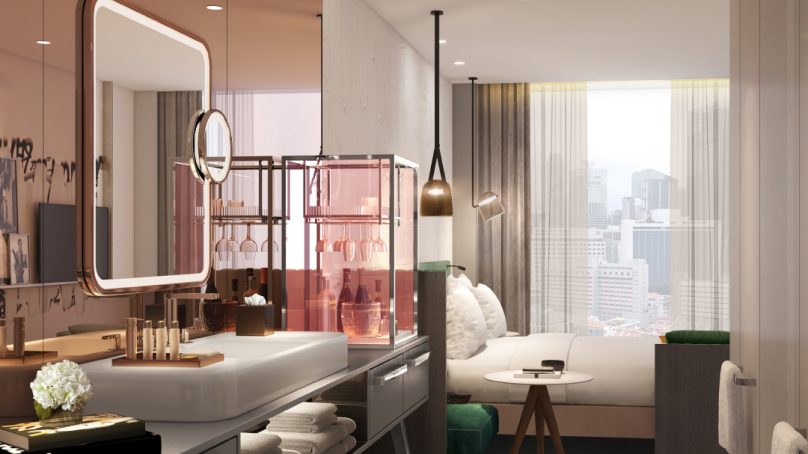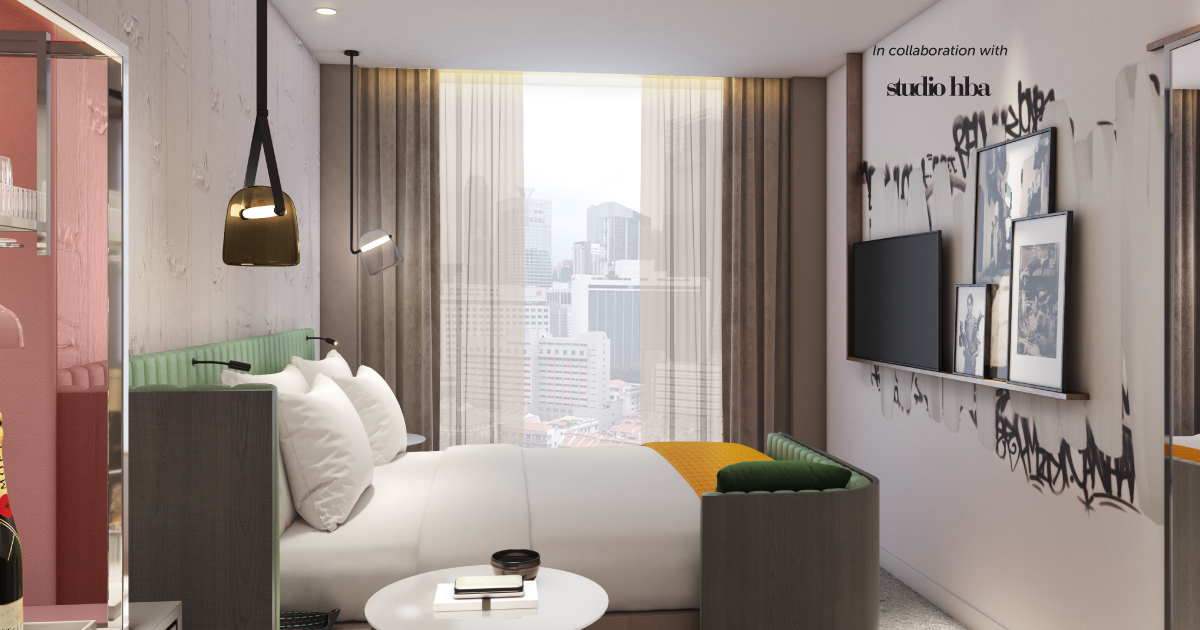

A hotel guest room is not only the most private of spaces we inhabit during our travels, but, ultimately, where we also expect our personal needs to be best met. The fact that these needs are constantly evolving, as preferences change, means hotel operators need to think creatively if they are to stay relevant to their guests. Standardization can no longer be the norm. For designers, it means creating guest rooms that are flexible and creative, but also accessible and practical. In addition, we need to leave space for guests to create their own experience, which we can do by placing them at the very center of the design process.
As designers, we are constantly thinking about the future of what guests expect from their hotel experience. Today, three key design trends are fast emerging: personalization; technology integration; and sustainability.
Getting personal
Everything is increasingly about personalization, from the settings on your phone and the way you order your coffee to the brands you choose to surround yourself with. All these carefully crafted personal choices say something about who you are, your choice of hotel being one of them. Hotel operators, therefore, need to adopt flexible design strategies for where people are drawn to gather and stay because the space is an expression of each guest’s personality. Hotel designers are exploring and addressing this in their design concepts, even offering guests the possibility of changing the ‘look and feel’ of their hotel rooms during their stay.
Designers are rethinking the configurations of the space and the degrees of personalization offered in guest rooms. Future rooms, at the very least, will need to accommodate multiple purposes, whether it is for work or relaxation, from movable walls and furniture and accessories that can be rearranged to balconies or terraces that can be used for rest or outdoor dining. Similarly, a high degree of personalization needs to be extended to allow for individual preferences, spanning in-room lighting and temperature settings, entertainment systems and amenities, minibars, workout equipment, bedding and soft furnishings. By prioritizing modularity and flexibility in hotel room designs, designers can meet the evolving needs of guests and create spaces that are versatile and adaptable, and ultimately capture guests, as they seek to repeat the experience on return stays.
Seamless technology
As technology becomes an integral part of our lives, the digital expectations of a new generation of travelers are driving hotel operators to adapt and change how hotels are designed and operated. Smart technology is making it possible for hotel operators to predict and personalize several guest services based on their previous visits and their aggregated guest data.
The installation of contactless technology continues to accelerate in the post-pandemic era. Customer-facing services are being overhauled, as technologies such as mobile check-in, contactless payments, voice control and biometrics, become available. Collectively known as the Internet of Things (IoT), they connect to automate certain tasks and deliver an ultra-personalized guest experience.
Travelers are becoming accustomed to the conveniences of new technology across all areas of life. As guests, they are also expecting their hotel rooms to be equipped with the latest technology, just like they have in their own homes, only better! This trend provides openings for hotel operators to partner with technology brands to showcase the latest advances in smart technology and share the investment costs. For example, guests already accustomed to unlocking their smartphones and laptops using facial and fingerprint recognition are expecting the same convenience in accessing their hotel rooms. A keyless entry system that allows guests to enter their rooms using their smartphones eliminates the need for them to carry around a physical key card. Similarly, the shift to in-room tablets is offering greater personalization, allowing guests to control the ambient settings in their rooms, to receive travel recommendations curated just for them and the practicalities of having ‘dynamic’ hotel information and in-room dining at their fingertips. Guests feel more comfortable during their stay because all the services curated are based on their expressed preferences.
Conversely, it is also important to note that hotels are responding to another growing trend by meeting the needs of guests who wish to ‘unplug.’ This includes offering ‘quiet rooms’ for those who wish to get away or adding extra quiet zones on the property, such as libraries or meditation rooms.
Prioritizing sustainability
With a global focus on climate change, hotels must play their part in generating more sustainable solutions. Sustainability is no longer a topic hotel operators can ignore – increasingly, it is a deciding factor in people’s choice of hotel. Placing sustainability center stage during the design process is a good starting point. Beginning with the design brief, sustainable materials can be incorporated in the construction, even down to the choice in furnishings for a guest room. The use of energy-efficient lighting and appliances, the installation of water-saving shower heads and toilets, and waste reduction through recycling and composting programs can all be considered during the design process. This approach can be extended even further to the type of in-room amenities offered, from ensuring guest consumables are made from recycled materials to the choice of in-room water filtration system for drinking water. Other strategies include offering in-room dining menus featuring locally sourced food and beverages, with organic and plant-based options made readily available.
Community-centered
Hotel spaces will become more personalized, adaptive and thoughtful. Actively participating in their neighborhood, hotels will also offer a dynamic environment, reacting and responding to guests’ personalities and needs, whilst building solid relationships within the local community to provide their guests with a greater sense of connection. Hotel designers have a critical role to play in advocating for design concepts that leave space for people to create their own experiences and, in turn, their own story.

Joris Angevaare,
partner at Studio HBA, part of the HBA Group















